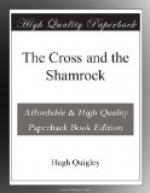“No,” said Murty, doubtingly. “You don’t tell me so, your reverence?”
“I tell you that there are no game laws, or only very nominal ones; so that, when you come back, if you and your dog traverse yonder mountain from top to bottom, you need not be afraid of the rifle of the gamekeeper, or of a sentence to a free passage to Van Diemen’s Land.”
“Murther! Must not they be very fine gentlemen here, to be so liberal? Signs by I shall, please God, one of these days, visit that old, grand mountain with the white head; and if there be a hare’s form in his rough sides or his curly beard, I will ferret it out, and soon have pussy by the hind legs.”
“I can see, Murty, you are growing poetical in your description of old Mount Antoine,” said the priest.
“Your reverence, did you ever see such a grand sight? I can’t help comparing that grand mountain there to the king of yon wild regions. The snow on the trees, on the summit, causes them to look like gray locks; and, looking down on the smaller mountains on every side, they appear like his subjects or his sons, which, in time, are to grow big like himself, affording shelter and refuge from the snares of the hunter to the wild animals of nature. O, how I like America!” said he, his enthusiasm still rising.
“That’s right, Murty; I am glad you do like it. Wait till summer or autumn, and then how beautiful these bleak hills will appear during these delightful seasons!”
“O sir, it is a great, grand country! No tyrants, no landlords, no poverty.”
“No poverty, Murty, except what is purely accidental, or brought on by the improvidence of individuals. In the very best regulated society there must, of necessity, be poverty less or more,” said the priest, by way of qualification.
“Every thing is free, and there is liberty for all. The very fences, you see, sir, unlike our stone walls at home, give liberty to the winds and storms to blow through them. The mountains are free to the huntsman; the very snow is free to blow and form itself into those beautiful banks, and little mountains, and castles, and stacks, and curtains, and drapery that we see on every side of us as we glide along.”
The priest listened with astonishment.
“Was there ever seen any thing so purty,” continued the peasant, “as those ridges and mounds of snow? I have seen the grandest buildings in Ireland,—Marlborough Street Church, in Dublin, the stone carving and ceiling in Cashel of the Kings, the stucco work on the old Parliament House in College Green,—but I think I see work in these fantastic snow banks that beats them all hollow. And—glory be to God!—all this beauty, so dazzling, so chaste, was created by a storm, when all nature was in a rage, and men shut themselves up in houses from its violence! I am glad now,” said he, “our landlord turned us out. I now forgive him for being the cause of our coming to this country of the brave and the free.”




